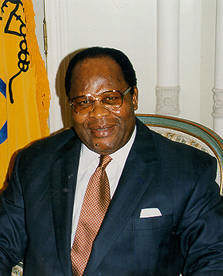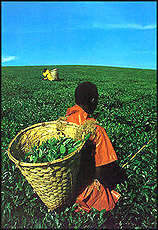 GOVERNMENT & ECONOMY GOVERNMENT & ECONOMY |
 CONSTITUTION CONSTITUTION |
Malawi’s new constitution guarantees freedom of speech, religion and assembly. The Government encourages investment and is looking to the private sector to assume the leading role in the economic development of the country. Malawi has a hybrid legal system. Criminal and Civil Law is based on English Criminal law. Malawi’s written constitution guarantees protection of investments, irrespective of ownership.
 GOVERNMENT GOVERNMENT |

On May 17, 1994 eligible Malawians went to the polls to vote in the Parliamentary and Presidential Elections after the constitution had been changed to enable more than one political party to operate in the country. The outcome to those elections was the election of Dr. Bakili Muluzi of the United Democratic Front as the country’s President in the first multi-party government in more that 30 years. Dr. Muluzi was sworn-in to the presidency on May 21, 1994, along with the Vice-President, the Right Honorable Justin Malewezi. The duo was re-elected for a second term on the 15th of June 1999.
The Malawi government currently comprises the Legislature, the Executive, and the Judiciary. The Legislature consists of a one-chamber parliament of 193 elected members. Unlike the First republic, the Head of State no longer appoints the Speaker of Parliament himself. The Speaker is chosen from among persons who are members of the Assembly and are qualified to be named as such.
The Executive consists of the Head of State and the Cabinet appointed from within and outside the National Assembly. Before the advent of political pluralism, Malawi had a two-tier judicial system. One tier was the High Court of Malawi and the Supreme Court of Appeal. The other system, which has since been scrapped, consisted of traditional courts at the area, district and national levels. The new Malawi Constitution, drafted during the time of political transition, became effective on May 18th, 1995.
Malawi’s capital was move from Lilongwe from Zomba in 1975. This meant the move of the central government offices from Zomba to an area where future expansion was possible. The shifting of the capital to Lilongwe also meant the possibility of constructing an international standard airport outside the city, catering for all kinds of air traffic. |  ECONOMY ECONOMY |
Malawi’s economy is based on agriculture, which accounts for about 50 percent of Gross National Product and more than 90 percent of the country’s export earnings. At least 70 percent of agricultural produce comes from smallholder farmers on customary land. The rest is produced by commercial farmers on estates. The main crops grown in Malawi are maize, tobacco, tea, sugarcane, groundnuts, cotton, wheat, coffee, rice and pulses.

Malawi is an exporter of primary produce and a net importer of industrial goods. Its major exports include tobacco, tea, sugar, rice and groundnuts while its major imports are intermediate (chemical and allied) goods for industry.
Malawi adopted an export-oriented growth strategy following independence, based on a large scale agriculture and agro-based manufacturing using foreign capital and managerial skills. The economy was directed at supporting private and parastatal projects in the productive agricultural sector through the provision of essential infrastructure, utilities and supporting services. Until the mid 1980s when structural adjustment reforms were introduced, parastatals and conglomerate Press Holdings Limited operated in all key sectors of the economy, often enjoying monopoly positions. Government control and regulation of the private sector was also significant. The country enjoyed a high economic growth rate up until 1979, driven by tobacco and tea exports. GDP growth for the first 15 years of independence averaged six percent every year. Between 1979 and 1982, Malawi’s economy went into recession. To get the economy back on track, the government believed the small- holder agriculture sector needed to grow, management of public resources needed improvement and private and public sector wage controls to be relaxed. Further liberalization of the foreign exchange, an overhaul of the monetary and tax systems improved incentives for foreign and local investors were also introduced.
Since the early 1990s, economic reforms aimed at, among other things, attracting foreign investment, have been stepped up. Price controls on all commodities have been eliminated and privatization of the parastatal sector is well underway. Malawi’s main economic activity continues to be in the agricultural sector. The major export crops include tobacco, sugar, groundnuts, rice, tea, coffee and cotton. Other crops include maize (the staple food), sorghum, millet, pulses, root crops and rubber. These crops are grown by both the smallholder farmers and estates. About 37 percent of GDP comes from agriculture. The other major sectors are manufacturing, utilities, construction, transport, distribution and communications as well as government services. |

